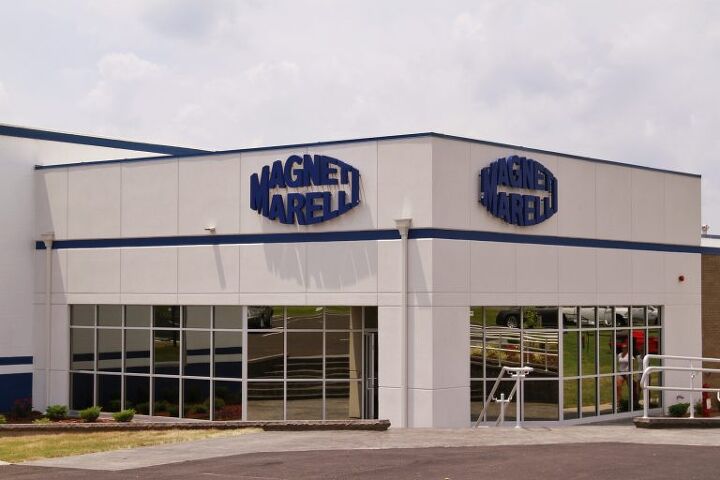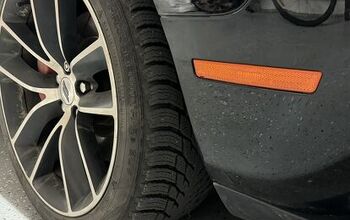In Vendita: FCA's Magneti Marelli Could Be Sold, Not Spun Off

In a story that’s been developing for some time now, Fiat Chrysler is inching closer to shedding its component supplier, Magneti Marelli.
According to a report, a private equity firm is reportedly in talks with the automaker to buy the parts business. This is a shift in direction for FCA which, in the past, was seemingly focused on spinning off Magneti Marelli rather than completing an outright sale.
The Wall Street Journal reports that an American buyout firm called KKR & Co. is in talks with FCA. The parts biz is estimated to be worth anywhere between $3.5 billion and $6.0 billion, depending on which analyst you ask. Whatever the sale price, it would be a large infusion of cash into the company’s coffers.
Mention of Calsonic was also uncovered by the WSJ during its research into KKR. Sound familiar? It should. Calsonic Kansei Corporation is a Japanese automotive parts company that has 58 manufacturing centers around the globe. The purchase of Magneti Marelli would create an auto parts giant and would likely lead to, erm, consolidation both from production and design considerations as there would be a measure of overlap with which to deal.
Sergio Marchionne was well-known for boldly stating his desire for alliance in the auto industry, as anyone with even the shortest of short-term memories will recall. Three years ago, he made major overtures to complete an FCA-GM merger, citing the ruinous financial wastage thanks to the duplication of models, technology, and R & D. The man had a point.
Sans Magneti Marelli, FCA would be an easier pitch, not unlike when a homeowner who is trying to sell their house tears down a handy but expensive-to-keep shed that was scaring away all potential buyers. Sure, the shed was useful but its additional maintenance costs made the entire package less attractive.
At this year’s Capital Markets Day, the company spelled out a five-year plan (one of many over the years) that appeared to blatantly ignore some of its brands while putting others to the fore. Any potential suitor for FCA would undoubtedly be taking it on for the crown jewel, Jeep. The absence of Magneti Marelli may be seen as a plus by some prospective purchasers.
Who would want to buy the joint? Speculation ranges from the PSA Group to Korean interests. A tie-up with PSA would give that company, which hopes to regain a foothold in America, an instant dealer network and all manner of local inroads. As for the Koreans, access to FCA’s successful crossover and SUV portfolio would do wonders to bolster their offerings in those segments.
Magneti Marelli manufactures numerous automotive components, from lighting to powertrain parts to electronics, and employs roughly 43,000 workers in 19 countries. Dozens of manufacturing plants exist under its umbrella. Started as a joint venture between Fiat and Ercole Marelli in 1919, the company officially became a Fiat subsidiary in 1967.

Matthew buys, sells, fixes, & races cars. As a human index of auto & auction knowledge, he is fond of making money and offering loud opinions.
More by Matthew Guy
Latest Car Reviews
Read moreLatest Product Reviews
Read moreRecent Comments
- Tane94 I'd be curious to know whether 87 octane is no longer the most popular grade of gasoline by sales volume. My Costco often runs out of Premium grade and I suspect 93 octane might now be the most popular grade of gas. Paying 40-50 cents more per gallon 87 vs 93 octane because of turbo engines is the real story
- Redapple2 125 large? You re getting into 911 territory.
- Redapple2 Industry worst quality prevents any serious consideration. I ll take an Evil gm Vampire Denali first.
- MaintenanceCosts Thing mentioned in the article: 77 pounds lighter than the standard version!Thing not mentioned in the article: The "lighter" curb weight is 3902 pounds. That is a few pounds heavier than my 2011 335i *convertible*.
- Carson D Printing a trillion dollars every hundred days was not the cause of inflation.


































Comments
Join the conversation
Maybe because I'm familiar with Lucas electrics, but the few times I've helped work on Fiats their system was a confusing mess. Of course that was old cars from the 50s thru 70s, so maybe they aren't that bad anymore.
Personally speaking I think a tie up with PSA would make huge sense. Instant volume in Europe meets instant instant volume in the US. The other suitor other than Hyundai for FCA might be Tata. Land Rover and Jeep have obvious synergies, as do Alfa and Jaguar. Tata brings volume in Asia plus a heavy truck business. Jaguar also brings electrification.....